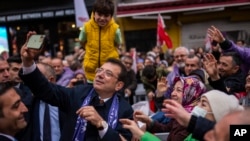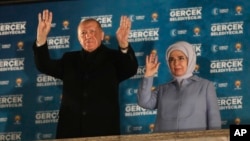Turkey’s main opposition party, the Republican People’s Party, won major victories in the mayorships of Istanbul and Ankara, dealing a blow to President Recep Tayyip Erdogan’s Justice and Development Party.
Erdogan’s party, known as AKP, had hoped to regain control of the cities less than a year after he claimed the presidency of the country for a third term.
With more than 90% of ballot boxes counted Monday, incumbent Istanbul Mayor Ekrem Imamoglu of the Republican People’s Party (CHP) was leading by a wide margin in Turkey’s largest city and economic hub, according to the state-run Anadolu Agency.
“The period of one-person rule has ended as of today,” Imamoglu, 53, told thousands of jubilant supporters on Sunday evening.
The former businessman, who entered politics in 2008, had defeated Erdogan’s candidate in the local election five years ago, ending 25 years of rule in the city by AKP and its Islamist predecessors. He is now touted as a presidential challenger.
CHP’s Mansur Yavas, the mayor of the capital Ankara, retained his seat with a stunning 25-point difference over his challenger, the results indicated.
In all, the CHP won the municipalities of 36 of Turkey’s 81 provinces, according to Anadolu, making inroads into many strongholds of Erdogan’s party. It gained 37% of the votes nationwide, compared to 36% for the president’s party, marking the CHP’s greatest electoral victory since Erdogan came to power two decades ago.
Erdogan began his political career as a mayor in Istanbul in 1994 and later won the country’s presidency for the first time in 2014.
During this year’s campaign, Erdogan promised a new era for the metropolis of nearly 16 million people. However, Imamoglu was reelected for a second term. The candidate, who first won the post in 2019, secured more than 50% of the vote and defeated the president’s AKP candidate by more than 11 points and almost 1 million votes.
Turkey’s local elections were competitive and gave citizens many options but took place in a “starkly polarized environment,” where more needs to be done to ensure freedom of expression, a European group of election observers said Monday.
“In line with the Council of Europe principles of democracy, rule of law and human rights, more needs to be done to ensure a political and media environment where there is a genuine freedom of expression, and reasonable and well-implemented framework overseen by independent judiciary,” Vladimir Prebilic, the deputy head of the observation mission carried out by the Council of Europe, told a press conference in Ankara.
The observation mission was composed of 26 observers from 16 European countries, who watched voting procedures in more than 140 polling stations, including in the largest cities, Istanbul and Ankara.
Turkish government officials dismiss criticism that Erdogan’s government has cracked down on dissent, eroded human rights, and brought the judiciary and other state institutions under its sway.
The election results dented Erdogan’s prospects of adopting a new constitution, which could potentially extend his rule beyond the 2028 conclusion of his term, analysts said. Though AKP and its allies have a majority in parliament, Erdogan would need broader support or a successful referendum for a new constitution.
“This is not an end for us, but actually a turning point,” Erdogan said in a somber and introspective speech early Monday, acknowledging a “loss of altitude” for the AKP.
“If we made a mistake, we will fix it,” he told crowds gathered at AKP headquarters in Ankara, without indicating what changes he might make within his party or in policy.
Turkey’s high cost of living, driven by almost 70% inflation, as well as the government’s aggressive interest rate hikes to rein in inflation, has alienated voters, according to analysts who also said Erdogan’s divisive politics eroded his party’s popularity.
The New Welfare Party, or YRP, which largely competed with the AKP over the support of conservative voters, took two provinces. It was the third-biggest party in terms of nationwide votes, taking 6.2%.
The party benefited by taking an even more hard-line stance than Erdogan against Israel over the Gaza conflict, which helped draw religious voters away from the Islamist-rooted AKP, analysts said.
In southeast Turkey, the pro-Kurdish Equality and Democracy Party took 10 provinces while the Erdogan-allied Nationalist Movement Party, or MHP, won eight scattered across the country.
Some information for this report came from The Associated Press, Agence France-Presse and Reuters.


